Key takeaways:
- Climate anxiety serves as a catalyst for positive change, driven by compassion for future generations and the state of the planet.
- Community involvement and shared actions, like clean-ups and local initiatives, foster hope and strengthen bonds while addressing climate issues.
- Mindfulness, journaling, and connecting with like-minded individuals are effective strategies for managing climate anxiety.
- Celebrating small victories in climate action builds motivation and reinforces the power of collective efforts in making a difference.
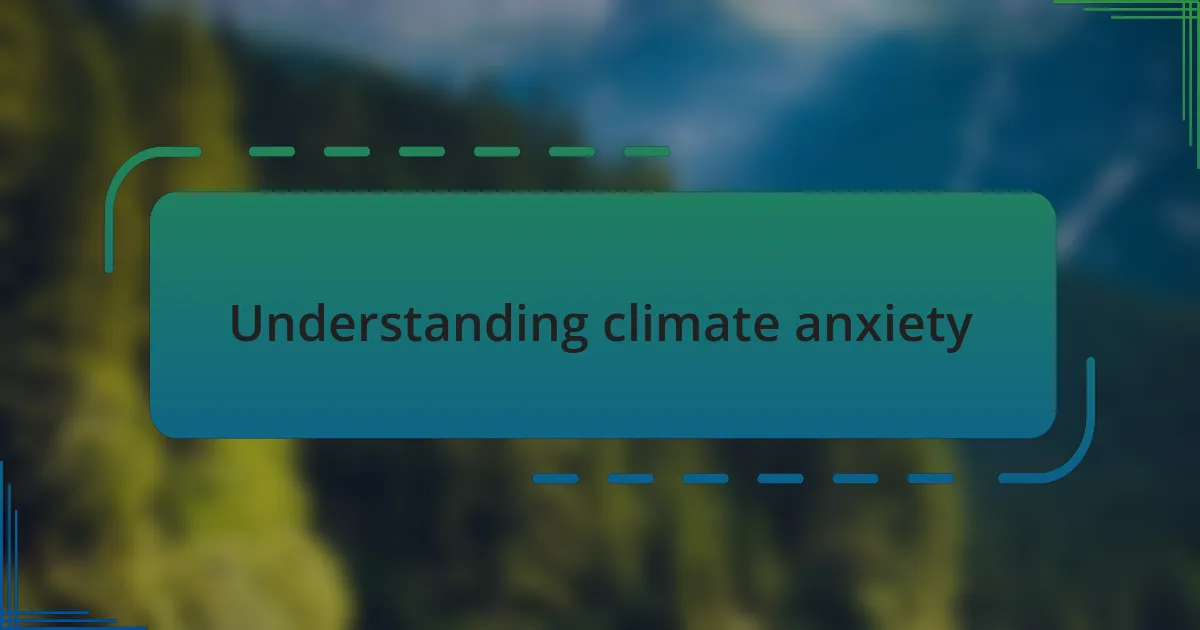
Understanding climate anxiety
Climate anxiety, for me, blossomed as I realized the severity of environmental issues. It wasn’t just a fleeting worry; it felt like a weight on my chest each time I learned about a new, dire report on melting ice caps or leading species extinction. Has that sense of helplessness and urgency ever struck you too?
One afternoon, I found myself staring at a news article, overwhelmed by the endless cycle of bad news. Those moments of despair made me question my role in this broader narrative of climate change. I wondered, is it possible to feel so deeply about a global crisis and yet maintain a sense of hope?
As I navigated through these turbulent emotions, I began to understand that climate anxiety often stems from a profound connection to the earth. It’s rooted in compassion for the future, for upcoming generations, and even for all the species sharing this planet with us. This realization transformed how I viewed my anxiety—I started to see it as a catalyst for change rather than just a source of fear. How can we channel this anxiety to foster positive actions and inspire others?
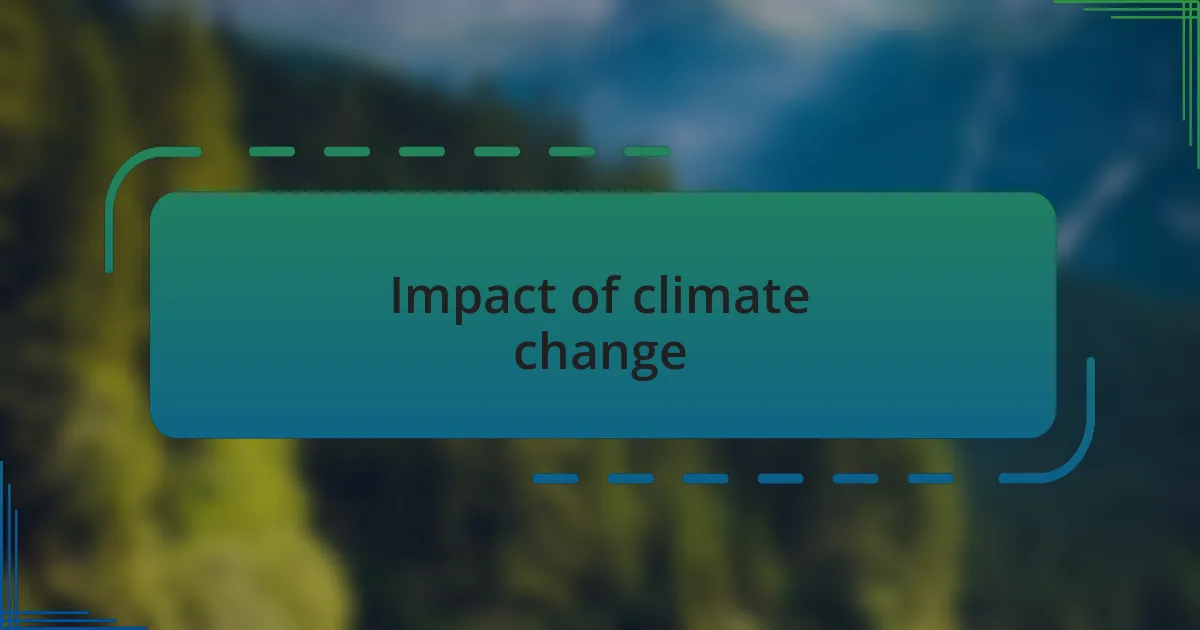
Impact of climate change
The impacts of climate change are far-reaching and deeply unsettling. I remember the first time I felt the environmental shifts firsthand during a summer that felt unrelentingly oppressive. The heat waves seemed not just unusually warm; they felt like a warning. Have you noticed how weather patterns have become more erratic? It’s like nature is losing its balance, and we can’t afford to ignore it.
As I observed frequent floods in my community, it struck me how vulnerable we are to these changes. Homes were lost, lives disrupted, and it all felt so preventable if we had acted sooner. Those moments ignited my passion for climate action. I began to wonder: how many more communities will suffer before we take decisive steps to mitigate this impact?
Moreover, the effect on biodiversity is alarming. I recall visiting a once-thriving local forest, only to find it plagued by invasive species that thrived in the warmer climate. Witnessing the fragility of ecosystems made me question our relationship with nature. How can we restore what we’ve lost? This ongoing dialogue within ourselves is crucial if we want to tackle the climate crisis effectively.
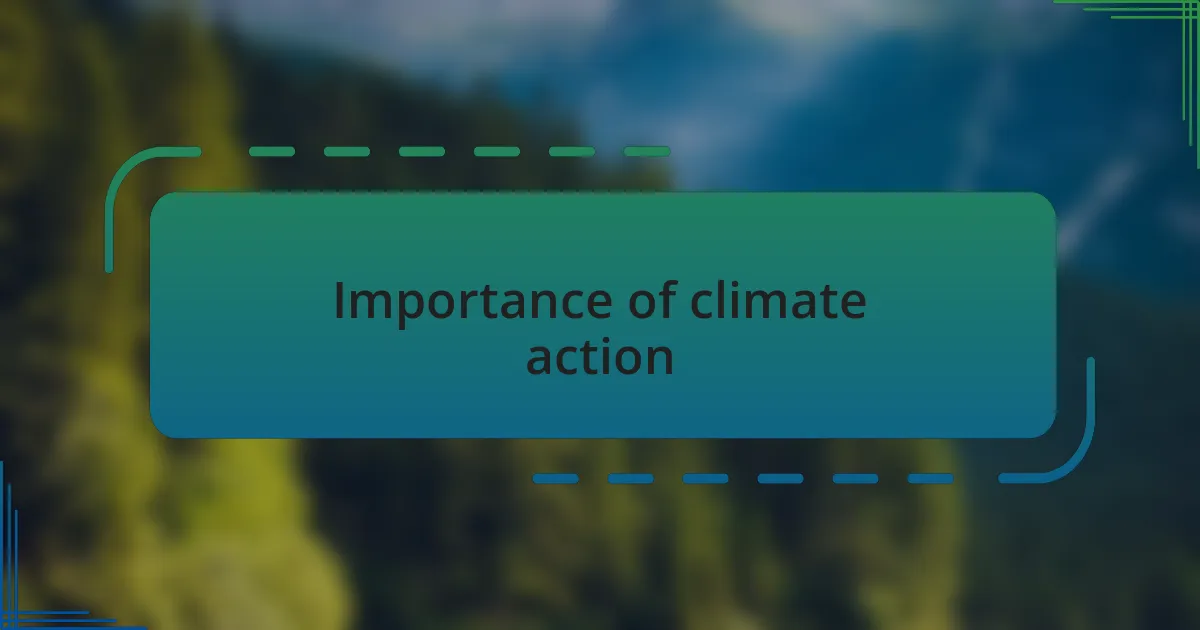
Importance of climate action
Taking meaningful climate action is essential not only for the environment but also for our well-being. I vividly recall a community meeting where we discussed rising sea levels. The concern in the room was palpable as parents spoke about the future of their children. It hit me then—our actions today significantly shape the world they will inherit. How can we stand by when the stakes are so high?
The urgency for climate action comes from the understanding that every small effort counts. In my own experience, I started by making simple changes, like reducing waste or choosing public transport. Those small steps empowered me, transforming my anxiety into purposeful actions. I often ask myself, “What impact can I make today?” It’s a reminder that collective efforts can ripple into significant change.
Furthermore, inspiring others to engage in climate action creates a supportive community. I remember leading a local cleanup initiative; the sense of camaraderie while picking up litter was profoundly uplifting. It reinforced that we’re not in this alone and gave everyone involved a surge of hope. Isn’t it encouraging to think that together, we can tackle such a daunting challenge?
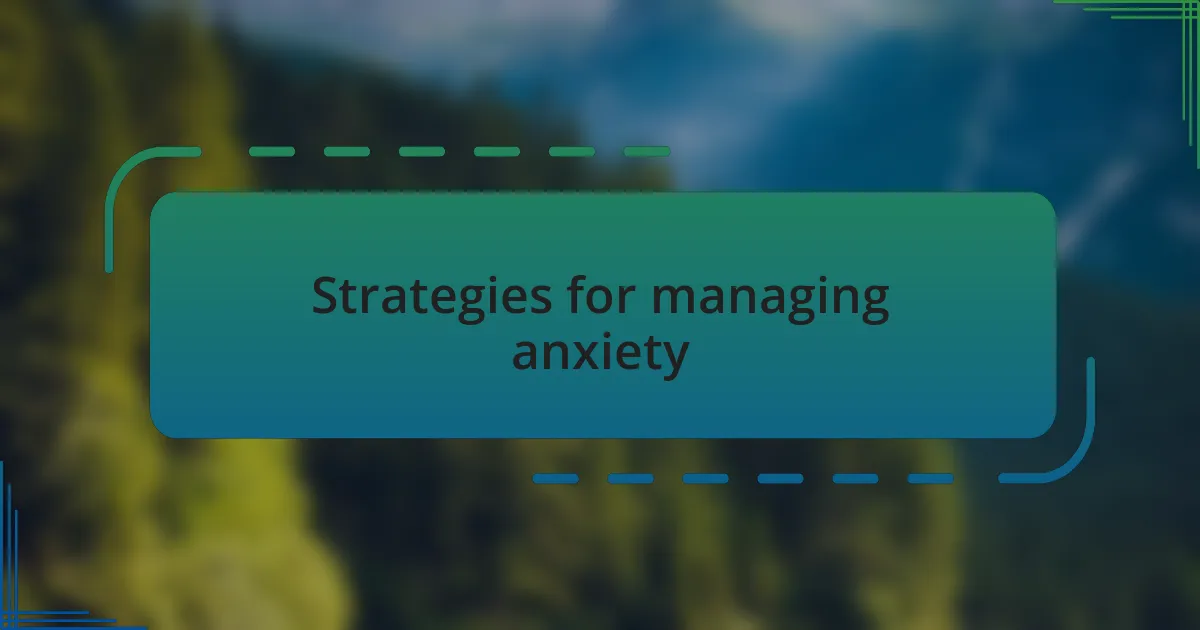
Strategies for managing anxiety
When I first felt the weight of climate anxiety, I turned to mindfulness techniques. Finding moments each day to pause and breathe helped me reclaim my thoughts. It was astonishing how focusing on my breath could bring clarity amid chaos, reminding me that I have control over my reactions.
I also started journaling my feelings about climate change. Pouring my worries onto paper transformed my anxiety into a concrete narrative. It helped me navigate the turbulent emotions swirling around in my mind and uncover patterns in my thoughts. Have you tried putting your fears into words? It’s a cathartic experience that can lighten the emotional load.
Connecting with like-minded individuals is another powerful strategy. I joined a local group focused on sustainability, and the energy from those conversations was electrifying. Sharing our experiences and strategies not only eased my anxiety but also fortified my resolve. Isn’t it comforting to know that you’re part of a larger movement, standing shoulder to shoulder with others who share your concerns?
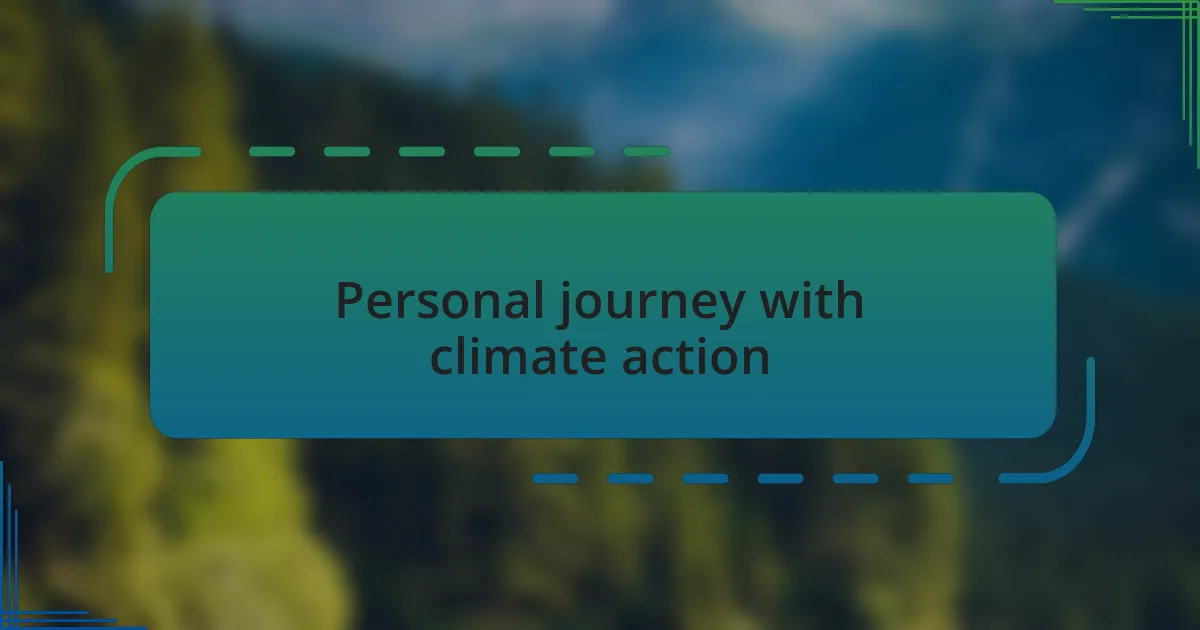
Personal journey with climate action
As my journey with climate action unfolded, I found myself drawn to local environmental projects. One weekend, I volunteered for a tree-planting event, and I still remember the feeling of soil slipping through my fingers. It was a tangible reminder that I was contributing to something greater than my anxiety. Have you ever felt that sense of purpose when taking action in your community?
Over time, I began to integrate sustainable practices into my daily life. Simple changes, like using reusable bags and reducing meat consumption, transformed my mindset. Each small step made me feel more empowered and connected to the cause. Does it surprise you how these little adjustments can shift one’s perspective?
One of the most impactful moments was when I attended to a climate march. The sight of thousands of passionate individuals, all demanding action, was exhilarating. It’s in these shared experiences that I found hope, even amid uncertainty. I often wonder—how can participating in collective action reshape our understanding of our role in the fight against climate change?
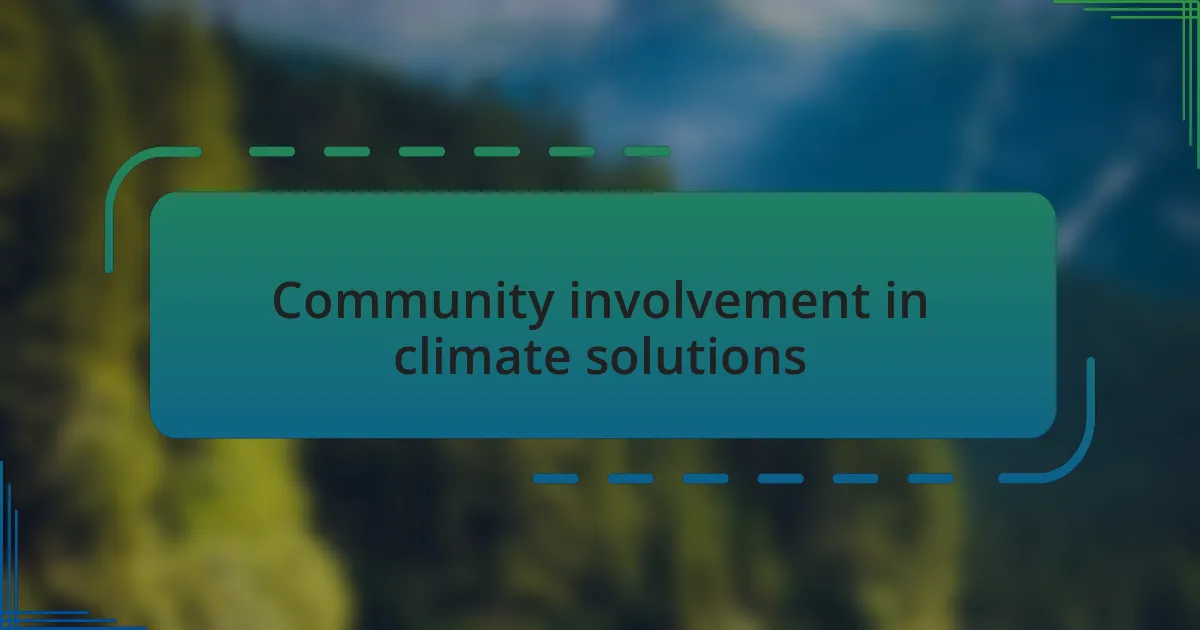
Community involvement in climate solutions
Getting involved with my community opened up new avenues for contributing to climate solutions. I remember attending a local sustainability fair where I met inspiring individuals and groups dedicated to meaningful change. It got me thinking: how often do we overlook the power of our neighbors in tackling such a monumental issue?
Participating in community-led initiatives, like beach clean-ups and urban gardens, fostered a sense of belonging. One day, while we collected trash along the shoreline, I noticed the diverse backgrounds of everyone involved. It struck me that climate action can be a unifying force, bridging gaps and creating friendships. Have you ever realized that the fight against climate change can also strengthen community bonds?
Even as I engaged in discussions about policy changes and renewable energy, I found grassroots movements to be incredibly motivating. I recall a meeting where citizens rallied for better public transport initiatives in our city. The energy in the room was palpable, and I felt a spark of optimism. Could this shared determination be the key to driving real change in our neighborhoods?

Lessons learned from my experience
The journey of navigating climate anxiety taught me the importance of embracing small, actionable steps. For instance, during my first swap meet for second-hand clothes, I felt a wave of relief. It was empowering to understand that reducing consumption didn’t require a grand gesture but a simple collective effort. How often do we underestimate our capacity to create change through everyday choices?
As I deepened my involvement in community projects, I learned that sharing my climate worries with others was transformative. I distinctly remember a late-night conversation with a friend, where we exposed our fears about the future. It dawned on me that vulnerability is a strength; discussing anxiety openly helped us forge stronger connections while recognizing we weren’t alone. Have you ever found solace in shared experiences?
Also, the realization that celebrating small victories is crucial for sustaining motivation became apparent. I recall a project where we transformed a vacant lot into a community park. The initiative felt monumental initially, yet we celebrated each stage—planting trees, organizing events. Those celebrations were essential reminders that even small actions can contribute profoundly. Reflecting on those moments, I ask myself: how can I continue to find joy in our shared progress?